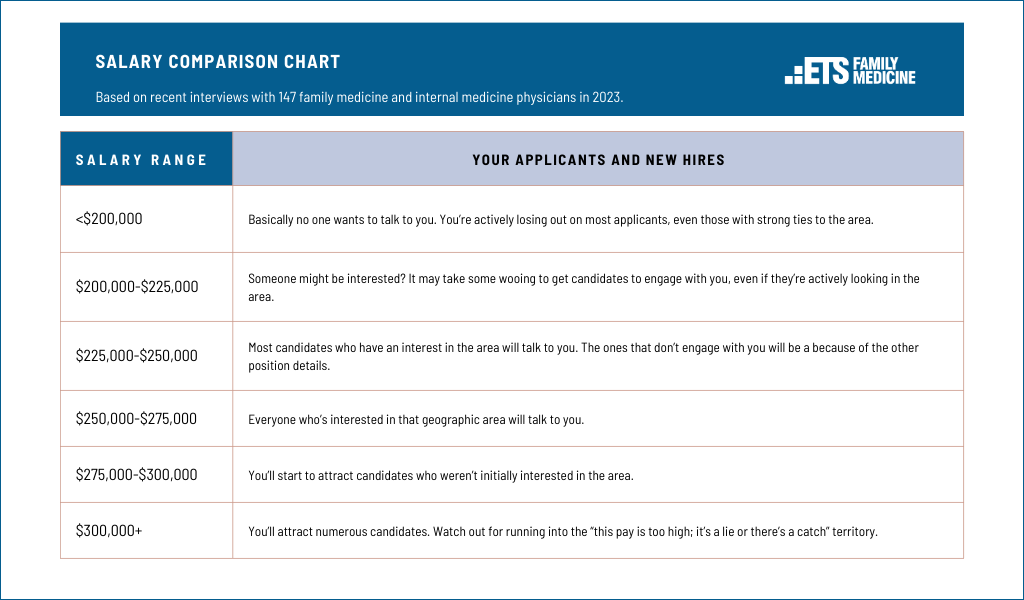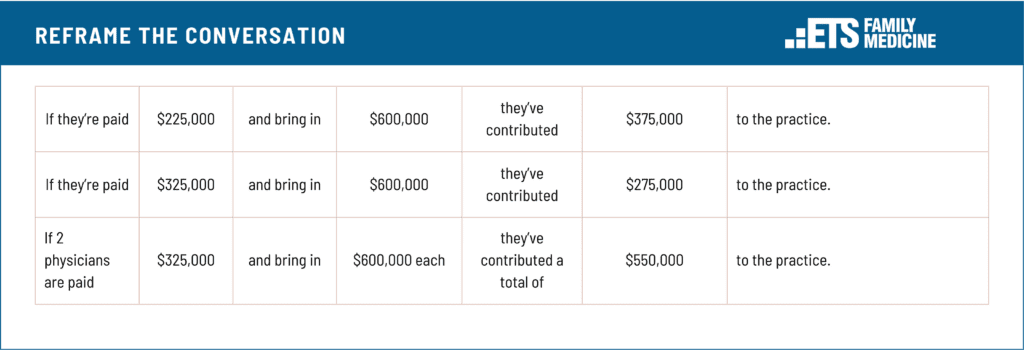“What Salary Should I Offer?”
The fourth installment in our series Family Physician Competitive Pay
Note: This for outpatient only, primary care family medicine physicians and internal medicine physicians.
Credibility of the author, Ben Kennedy, ETS Family Medicine Recruiter:
“In 2023, I’ve interviewed 147 family medicine and internal medicine physicians. We typically discussed multiple jobs and I witnessed firsthand their reaction to compensation. Geography is the main determining factor on which positions candidates consider so it’s important to think of compensation within the context of geography. Here’s a nationwide snapshot of what I would recommend offering for a guaranteed base salary and the biggest piece of advice I can give regarding compensation.”

Beware the Binary.
Even though a table presents it as cut and dry, this is actually a sliding scale with marginal increases instead of large jumps. Offering $226,000 for a guaranteed base salary isn’t going to get you a bunch more applicants than $224,000. Offering $249,000 as guaranteed base salary will get you a lot more candidates than offering $201,000.
How to Talk About Compensation In Job Postings and Conversation.
A question I never get asked by candidates is, “All-in, what is a range I could reasonably expect to earn?” The answer is powerful and I’d recommend answering it before you get asked (because you probably won’t).
My biggest piece of advice when addressing the compensation question: Break out guaranteed base salary and what a reasonable expectation would be for compensation considering all bonuses.
There is so much justified skepticism around pay transparency for family medicine physicians. Saying you have RVU bonuses THEN attempting to hide that 2 out of 3 physicians in your group never hit the goals and never earn a bonus from it will erode trust and ultimately hurt you. Avoid the ‘send out your champion’ mentality of saying, “One physician here earns $403,000 a year.” The question the candidate asks themselves is, “Well, what are the others making?”
Be as transparent as possible. Posting ‘competitive pay’ or ‘generous compensation’ or ‘competitive based off of MGMA guidelines’ comes off as being evasive and deceptive.
One group that I really enjoy recruiting for is a value-based concierge practice. They offer the following:
“We offer $250,000 a year as a guaranteed base salary for our family medicine physicians and internal medicine physicians. Our bonus can be up to $70,000 a year based on quality metrics. No RVUs, no volume, no production, nothing like that. The quality metrics that determine the bonus are things like disease detection and patient reviews. 7 out of 10 of their physicians earn the full bonus. So a typical primary care FM/IM physician earns $320,000 a year, all-in.”
That’s a compelling story that gives candidates a strong idea of what’s going on. Candidates always have a great reaction to that spiel. The rare group of candidates that doesn’t talk to them is because it is a geriatrics only position (did you notice which tranche this group fell into?).
If it’s too Good to be True…
it probably isn’t true. If you’re offering $300,000+ and run the risk of creating skepticism about your offer, get ahead of the curve by addressing the worst parts about your opportunity in your job postings. Candidates will appreciate the candor of:
This is a very rural community. If you want dinner from a restaurant after 5:00 pm on a Sunday, your choices are KFC or a 2-hour drive.
“Get real, kid.”
You may have visibly winced if you’re a decision maker for the compensation of the guaranteed base salary for an outpatient-only primary care family physician or interests. “And how exactly am I supposed to offer $307,000 as a guaranteed base?!?!?”
Here’s a reframe to consider: It’s reasonable for an alright family physician to bring in $600,000 to a primary care practice in a given year (can be a lot higher, shouldn’t be much lower).

The downside is taking a big hit when paying someone high compensation before they’re producing a lot. After that initial period when they’re now up-and-running, would you rather have $550,000 in contribution to the practice from two physicians or $375,000 from one that could get poached? Besides, do you think the physician who is paid $325,000 a year brings in the same amount of money to their practice as the physician who is paid $225,000?
What about the Benefits and Add-Ons?
You simply have to offer health insurance and malpractice insurance. If you don’t, candidates will see you as an oppressive, stingy employer. Not to say that you are, of course! From their perspective: if it walks like a duck and quacks like a duck—it’s probably a duck.
Sign-on bonuses (I’ve seen $15,000 to $50,000, typically it’s $20,000), student loan assistance, relocation assistance, and generous vacation time will score you an applicant here and there. They are in order of importance. The darndest thing is that most people only care about one or two of these.
e.g., You have three physicians looking at your job post. You want them all to apply so you’ve amped up the sign-on bonus. Turns out only one of them cares about a sign-on bonus. The other two care about vacation time. Or maybe all three care about relocation assistance and none of them care about a sign-on bonus or vacation time. It’s a probability game and sometimes the benefits help, sometimes they don’t matter. Just depends on who happens to scroll by.
CME time, CME budget, holidays/weekends off (again, we’re talking primary care here), dental insurance, vision insurance, short-term disability, long-term disability, and retirement just aren’t interesting or special. Don’t take these away, though! The reason it doesn’t increase applicants is because pretty much everyone does it.
Something to Think About.
You’re very unlikely to hire a physician at $275,000 and later think, I don’t really want this doctor at $275,000, but would be glad to have them at $250,000. While I would never encourage you to be reckless with the hard-earned production you’ve brought into the practice, most hiring decisions are either good choices or not. If you have a candidate you prefer and you feel will make your practice stronger, be good with patients, fit your needs better, and make your day-to-day office environment more pleasant—have the courage to deviate from your standard salary or typical benefits.
The decision to deviate comes very late in the conversation with a candidate. I’m focusing on who you might attract to a position.
But Wait, There’s More!
Besides, the cost of turnover is about 1.5 to 2 times that worker’s annual salary and you may want to read a book by a doctor about how to improve retention in ways other than compensation.
Compensation will change in the next 3 years as revenue models evolve and compensation information is made accessible to everyone. It’ll be a slow change because, well, healthcare.
Your Table is Nice, but I’m Special
To learn more ways to attract candidates, speak with a specialized independent recruiter for outpatient-only primary care family medicine and internal medicine physicians. Text or call me at (540) 400-7641 or email me at bkennedy@etsfamilymedicine.com. Talk to you soon. – Ben Kennedy



